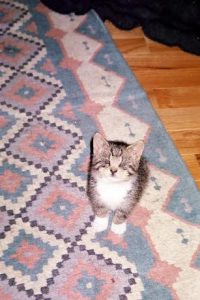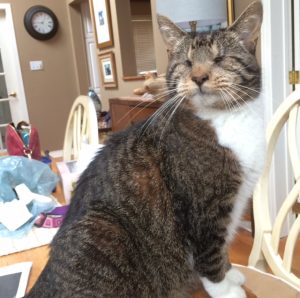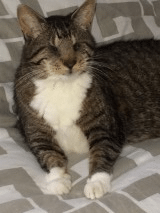Tinkerbelle, the Blind Cat – Dr. Amanda Glew
As a veterinarian, I have had the pleasure and privilege of vetting animals with many disabilities – the 3 legged labrador, the paraplegic daschund, and numerous vision impaired dogs and cats. However, there is a difference when dealing with an animal who goes blind, versus one who is born blind. This is the story of Tinkerbelle, who was born blind.
Tinkerbelle was brought to my old clinic in 2001 with her sister. Her sister had vision. A bit of a novelty, we did not know what we should do with this kitten, and I admit, I thought it would be more kind to euthanize. Having worked in and with shelters for so many years, we often tend to think “if there are so many healthy animals to be adopted, why adopt out a maimed one?” I am happy to say that I did not euthanize her because our groomer at the time decided to adopt her. In her words, this is why she did it:
“Just the thought of what an abandoned, blind kitten had gone through overwhelmed me and of course, that’s all I could think about. After asking around if a blind

kitten could have a good quality of life and hearing that yes it could, I returned to the clinic to meet her. I felt that if she was feral and fearful then maybe it would be more humane to euthanize her. This, as it turned out, was not the case. I walked up to the top cage in grooming where they had her, speaking softly. As soon as she heard a voice she chirped got up and walked confidently up to the front of the cage, crawled up to the crook of my neck and settled down purring. Strangely, her sister, who was able to see, remained quietly in the back of the cage, too scared to come forward.”
She was named Tinkerbelle because she was so small and brave. Susi had no idea how she would adapt in her house with other dogs and cats, but she was willing to try. And as is often the case, animals teach us life lessons. Determined to get her to use a litterbox, the first attempt to crate her was a disaster. Tink wanted out. So she closed her room off and within minutes, this tiny blind kitten had managed to find her way to the bed and crawl onto it. She loved her comfort, and used the litterbox without fail. But how does one “play” with a blind animal?
“To stimulate her senses, I put bird feeders outside my window so she could hear the birds chirping and I played hunting games with her with a feather tickler that had a bell. I think she was one of the happiest cats that I have ever had.”
2 months later, Tinkerbelle’s sister had not been adopted, so Susi took her home. It was at this time that Tink learned to navigate jumping up to a dresser. After that, she would jump on and off sills, tables and all sorts of heights.
“I remember one day, I found that Tinker had managed to get up onto a tall dresser in my room. Unsure of how she could come down… I watched as her sister “Phoebe” jumped up on the dresser…sat beside Tink for a few minutes and jumped off of the dresser. As soon as Tinker heard the ‘ THUNK” of Phoebe hitting the floor, she knew how far down the floor was and without any hesitation, followed and landed beautifully.”
Tinkerbelle lived in her bedroom for 2 years, but one day managed to escape behind Susi, and tumbled down the carpeted stairs. Terrified, Susi consoled the panicking cat, and coaxed her up each step at a time. Tinkerbelle must have counted those stairs, as from then onwards, she was able to navigate the stairs.
“Whenever she was down stairs and become a bit disoriented, I would pick her up and bring her back to the bottom of those stairs and that way she always knew where she was. Having access to the whole house opened up a whole new world for her. She now had full reign of my 2 storey cottage and took full advantage of it.”
 Tinkerbelle’s adventurous spirit made everyone marvel at how an animal can manage. She learned to carry her whiskers forward – rather like her “white cane”. When she would come onto something in her path, such as a dog, she would try to move them. If they did not move, she would let out a disgruntled “hmph” and figure out another way to get to where she needed to go. After 15 years, Tinkerbelle’s time had ended. I was asked to come to her house, because strange places would unnerve her. I asked Susi to tell me about why she had adopted her, and what we could learn from that experience. This is what she wrote to me:
Tinkerbelle’s adventurous spirit made everyone marvel at how an animal can manage. She learned to carry her whiskers forward – rather like her “white cane”. When she would come onto something in her path, such as a dog, she would try to move them. If they did not move, she would let out a disgruntled “hmph” and figure out another way to get to where she needed to go. After 15 years, Tinkerbelle’s time had ended. I was asked to come to her house, because strange places would unnerve her. I asked Susi to tell me about why she had adopted her, and what we could learn from that experience. This is what she wrote to me:
“Tinkerbelle had no idea that she was a blind cat….she just knew that she was a cat with all the same instincts and needs as a sighted feline. She never wasted her time in self pity. I just tried to help her lead a truly normal life. Another lesson in all this is you have to know your own limits and abilities when you get involved with a special needs animal. You have to adjust your lifestyle to meet their needs. If you are not willing to do that then forget it. Taking on a blind cat was my CHOICE. I did so because I felt I would be able to give her a good life. You have to leave your pity outside the door. It has no place in dealing with an animal with a disability. They just want to get from point A to point B…help them…don’t pity them or feel sorry for them.
Tinker blessed my life for 15 years. I never for one minute regretted one second of it. You couldn’t help but admire her spirit. I have looked for another blind cat to join our family since I figure I’ve got this “blind cat thing” figured out. I haven’t found her yet but would more that welcome the opportunity to learn a few more life lessons.”
If only we as a society could take the lessons learned from Tinkerbelle and apply them to our fellow disabled humans, the world would be a better place. That in essence, is the magic Tink left behind. My next blog will be about dogs who lose their sight, and how their humans learn to manage an acquired disability.
 Montreal Dog Blog Montreal's Online Dog Park
Montreal Dog Blog Montreal's Online Dog Park





